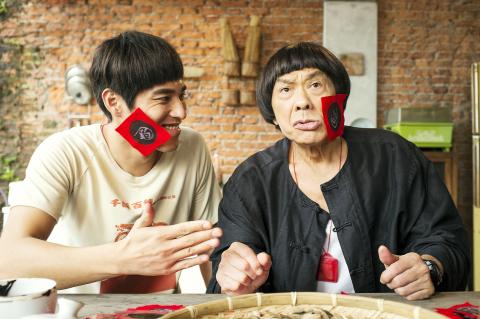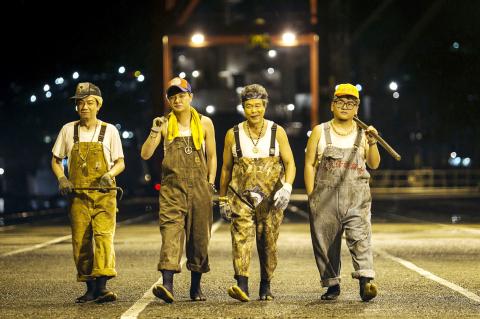If sappiness, melodramatics and exaggerated antics are staple features of Taiwanese commercial cinema, then 70-year-old Chu Ko Liang (豬哥亮) is its granddaddy. It seems just yesterday that Liang reemerged after keeping a low profile for more than a decade, but Hanky Panky (大釣哥) marks his sixth-straight Lunar New Year comedy — all massive box office successes. To be expected, the film is chock full of the aforementioned elements, and, of course, Liang’s trademark bathroom humor.
But the strange thing is that what would usually be cringe-worthy and outlandish makes total sense when Liang is in the mix. After all, he hails from a time where nonsensical comedies were still funny. All he has to do is be himself (or his usual stage persona) — the crass, inappropriate and over-the-top old man with the eternal bowl cut — and everything else seems to flow naturally. That said, Liang does rein in the weirdness for brief spurts and delivers a decent performance as a worried father whose son is about to be sentenced to death.
One might even complain that the film is tamer than expected, but Liang says he purposely created a more well-rounded character that is closer to his ideal of the “true Taiwanese man.” Liang says he has felt something missing in his previous films despite box office success, and decided to be more hands-on with Hanky Panky. Collaborating with former co-star Blue Lan (藍正龍), Liang reportedly spent three years coming up with the plot and setting before handing the reins to director Huang Chao-liang (黃朝亮), who directed Liang’s 2015 A Wonderful Wedding (大喜臨門).

Photo courtesy of Hualien Media
The result is nothing spectacular, and you’ll probably forget this movie once it’s over. But it isn’t a bad film for what it is: another solid and entertaining Liang-style comedy with a decent storyline and a surprising amount of chuckles, which is exactly what people are looking for in a holiday blockbuster. There’s even a somewhat clever twist at the end. But if you don’t understand Hoklo (also known as Taiwanese) or Mandarin, much of the humor will be lost in the subtitles. Even the Chinese film title is a pun, and god knows where they got “Hanky Panky” from.
There’s also a lot of pop culture-specific humor. For example, a scene where a female clerk at a sperm bank moves in slow motion will make no sense if you didn’t know that she is played by a guest actress whose claim to fame is imitating the DMV sloth clerk in Zootopia. What there isn’t in this movie, surprisingly, is swearing.
Liang plays Dadiao, a martial artist turned Chinese medicine practitioner who regularly commits petty theft with his son Hsiao-lung (Lan, also with a bowl cut). When Lan gets in trouble after borrowing money from his father’s enemy to send the love of his life (whom he just met) to law school, Liang must find a way to save him.

Photo courtesy of Hualien Media
Of course, the self-deprecating dirty old man gets no love in the film, and the romance falls to Hsiao-lung and Hsin-yi (Aggie Hsieh, 謝沛恩), who hold their own but lack Liang’s power of making the absurd seem normal. As a result, their scenes are mostly awkward and tacky.
Don’t dismiss Liang as a fool just because of his bumbling on-screen persona. There’s a reason he’s been able to stay relevant despite pulling the same old tricks decade after a decade. He knows how to tell a story, and most importantly, he knows how to make fun of himself — which is where most other Taiwanese screwball comedies fall short.

Taiwan has next to no political engagement in Myanmar, either with the ruling military junta nor the dozens of armed groups who’ve in the last five years taken over around two-thirds of the nation’s territory in a sprawling, patchwork civil war. But early last month, the leader of one relatively minor Burmese revolutionary faction, General Nerdah Bomya, who is also an alleged war criminal, made a low key visit to Taipei, where he met with a member of President William Lai’s (賴清德) staff, a retired Taiwanese military official and several academics. “I feel like Taiwan is a good example of

March 2 to March 8 Gunfire rang out along the shore of the frontline island of Lieyu (烈嶼) on a foggy afternoon on March 7, 1987. By the time it was over, about 20 unarmed Vietnamese refugees — men, women, elderly and children — were dead. They were hastily buried, followed by decades of silence. Months later, opposition politicians and journalists tried to uncover what had happened, but conflicting accounts only deepened the confusion. One version suggested that government troops had mistakenly killed their own operatives attempting to return home from Vietnam. The military maintained that the

Taipei Mayor Chiang Wan-an (蔣萬安) announced last week a city policy to get businesses to reduce working hours to seven hours per day for employees with children 12 and under at home. The city promised to subsidize 80 percent of the employees’ wage loss. Taipei can do this, since the Celestial Dragon Kingdom (天龍國), as it is sardonically known to the denizens of Taiwan’s less fortunate regions, has an outsize grip on the government budget. Like most subsidies, this will likely have little effect on Taiwan’s catastrophic birth rates, though it may be a relief to the shrinking number of

Since its formation almost 15 years ago, Kaohsiung rock band Elephant Gym (大象體操) has shattered every assumption about contemporary popular music, and their story is now on screen in a documentary titled More Real Than Dreams. It’s an unlikely success story that says a lot about young people in Taiwan — and beyond. For a start, their sound is analog. In the film, guitarist Tell Chang (張凱翔) proudly says: “There is no AI in our sound.” His sister, bass player KT Chang (張凱婷) is the true frontwoman — less for her singing abilities than for her thunderous sound on the instrument. Fast like